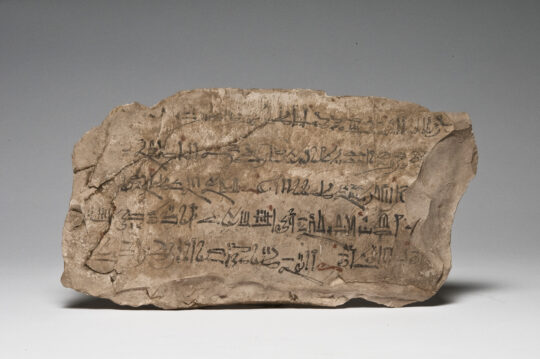13.09.2023
Teaching of Hordjedef
 © SMÄK, Marianne Franke
© SMÄK, Marianne FrankeThe teachings of Prince Hordjedef, which unfortunately have only been preserved in a small part, are the oldest literary work in Egypt. He was a son of King Cheops of the 4th dynasty (around 2530 BC), who, however, did not become king himself. His teachings, often referred to and quoted in later times, have been preserved in transcripts from the Ramesside period, taken from lessons in the scribal schools of that time. Shards (ostraka in Greek) of clay or limestone chips were used as cheap writing material for exercises and were used for short messages, accounts, and the like. Artists also used them for design sketches of reliefs or paintings.
The life teachings belong to the most important literary works of ancient Egypt. As the quintessence of a lifetime of experience, they contain rules of conduct not only for a successful, but above all ethical and socially just life. They are always passed on in literary fiction from father to eldest son. The king, members of the court, and high officials are named as the authors of the life lessons.
The central theme of the surviving passages of the Teachings of Hordjedef is the provision for one’s own grave and the endowment of the dead as a problem fundamental to the social structure of the Old Kingdom.
“Is there anyone like Hordjedef?”
With these words, the king’s son is praised in a later New Kingdom papyrus as a classic of ancient Egyptian literature.
Beginning of the teaching that the prince and count,
the king’s son Hordjedef, wrote for his son named Autibre, whom he raised.
He speaks: (…)
“If you can feed yourself
and establish a household,
then marry a capable woman;
then a son will be born to you.
If you then build a house,
it is for your son,
and a place will be made for you
where you can stay.
Make your grave well furnished
And prepare thy place in the west.
Take to heart: Low is death to us –
take heed: high is life for us -,
but the grave is for life! (…)
Appoint for yourself an overseer for the offerings
and a priest of the dead for the grave
so that he may offer you libations,
as anyone who makes a will.
Choose for him a plot of land from your fields,
that is flooded every year.
That will be more useful to you than a natural son;
Promote him more than your heir.
Remember what they say: there is no heir,
Who remembers for all eternity.”
Limestone
Deir el-Medineh
H. 13 cm, W. 25 cm, D. 2.5 cm.
New Kingdom, 20th Dynasty, 1200-1100 BC.
ÄS 3400
(Exhibited in the room “Writing and Text”)

